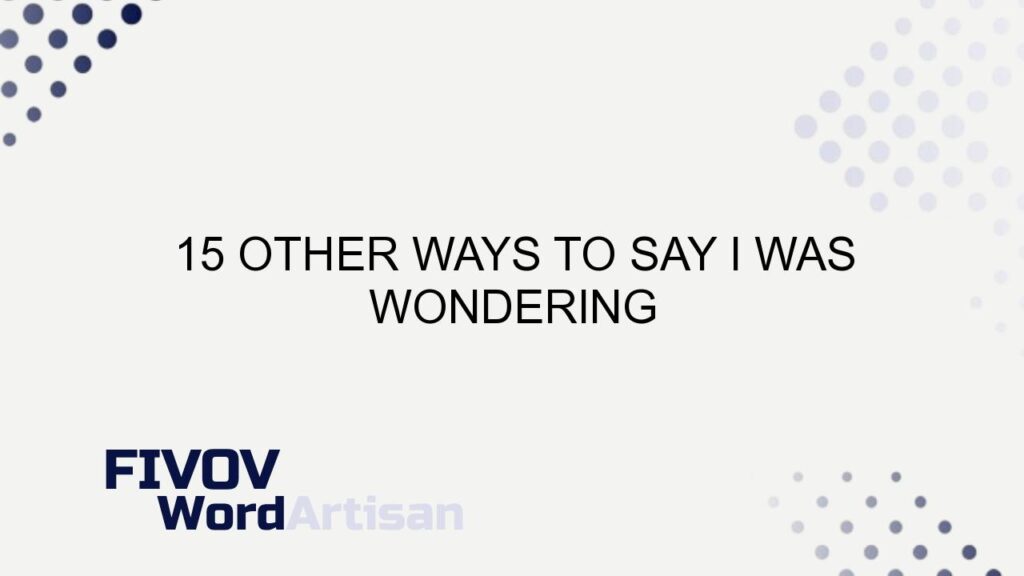Are you attempting to determine if something is feasible but find yourself needing to inquire first? Maybe you’re concerned that the phrase “I was wondering” might not be the most professional way to ascertain if an action can be undertaken.
MY LATEST VIDEOS
Well, you’ve come to the right place to find out more. This article will show you how to professionally say “I was wondering” when you need it.
Other Ways to Say “I was wondering”
When searching for other ways to express “I was wondering,” it’s essential to consider the context and the level of formality required. Here are 15 alternative phrases that can convey the same meaning with professionalism and clarity.
1. “I would like to inquire about”
2. “Could you provide me with information on”
3. “Might I ask”
4. “I’m curious to know”
5. “I’m interested in finding out”
6. “Do you happen to know”
7. “I’m seeking clarification on”
8. “Would it be possible to advise me on”
9. “I’m hoping to understand”
10. “I’d like to get some details on”
11. “Can you shed light on”
12. “I’m in need of some information regarding”
13. “Would you be able to help me with”
14. “I’m exploring the possibility of”
15. “Might you have any information about”
Each of these phrases provides a polite and professional way to inquire about something, allowing for clear communication and a respectful tone in your interactions.
Different Situations, Different Phrasing
The context in which you use these alternative phrases plays a significant role in determining which one is the most appropriate. Let’s explore how each phrase can be tailored to fit different scenarios.
Formal Inquiries
When making formal inquiries, especially in a professional or academic setting, it’s crucial to use language that is respectful and articulate. Phrases like “I would like to inquire about” or “Could you provide me with information on” are ideal for formal correspondence, such as emails to supervisors, professors, or business contacts.
Casual Conversations
In more casual conversations, with friends, family, or colleagues in non-professional settings, phrases like “I’m curious to know” or “I’m interested in finding out” can be used to express a sense of curiosity without sounding too formal or rigid.
Seeking Help or Advice
When seeking help or advice from someone, phrases such as “Can you shed light on” or “Would you be able to help me with” demonstrate a polite and considerate approach, showing that you value the other person’s expertise and willingness to assist.
FAQs About Professional Communication
As you strive for polished and professional communication, you may encounter common questions and concerns. Here are some frequently asked questions about professional language use and communication.
Why is it important to use professional language in inquiries?
Using professional language in inquiries is important because it sets the tone for respectful and clear communication. It demonstrates politeness, consideration, and a level of formality that is often necessary in professional or academic settings.
Can I use more than one phrase in the same inquiry?
Yes, you can certainly use more than one phrase in the same inquiry, especially if you want to emphasize your politeness and the importance of the information you’re seeking. However, it’s essential to strike a balance and not sound overly formal or verbose in your communication.
How can I improve my professional communication skills?
Improving professional communication skills can be achieved through practice, observation, and seeking feedback. Pay attention to how others communicate in professional settings, and consider taking courses or workshops focused on business writing and professional communication.
Bringing It All Together
In the world of professional communication, the way you phrase your inquiries can have a significant impact on how you are perceived. By using the alternative phrases provided in this article and adapting them to fit different situations, you can effectively convey your inquiries in a professional, respectful manner.
Remember to consider the context, your relationship with the person you’re communicating with, and the level of formality required in each situation. Professional communication is a valuable skill that can enhance your interactions and create a positive impression in various professional and academic settings.
Moreover, sharing this valuable information with your network can help others improve their communication skills as well. Encourage them to share this article on social media and other platforms to increase its visibility and provide value to a wider audience.
By incorporating these strategies into your communication repertoire, you can confidently navigate inquiries and discussions in a professional and courteous manner. Whether you’re seeking information, requesting assistance, or engaging in formal correspondence, the way you phrase your inquiries makes a difference in how they are received.




